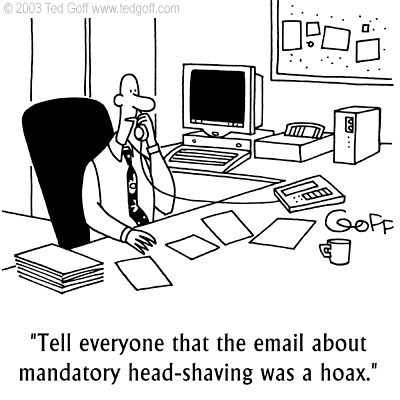|
Email Hoaxes Email Hoaxes: Check 'em Out, Don't ForwardSpam and malware—nasty virus, worm, spyware, and such software—turn many peoples' email inboxes into bloated wastelands. Anti-virus and anti-spyware tools help prune the weeds. However, another hazard lurks as seemingly innocent email: hoaxes, chain letters, and sob stories, all urgently demanding that you "Forward this to everyone you know, right now!"
Many of them come from well-meaning friends, relatives, and colleagues. Others come from legitimate mailing lists you've subscribed to, and some surely come as spam. They often have a common structure: they tell a plausible story, cite seemingly authentic sources, contain specific details, offer a compelling reward or threaten something scary, and issue a call to action. Before following the instructions, remember that something isn't true just because it's on the Internet, whether as email or a Web page article. Early on, the Internet was said to make everyone a publisher. While that can be true, it doesn't mean that everything published is true or well intended. I've seen earnest warnings posted to work-topic mailing lists, such as a story about a new method of carjacking becoming common at gas stations. The results of a five-second Google search (entering the words carjacking, hoax and "gas station") revealed dozens of links such as Hoaxbusters. It showed the warning to be a hoax. A similar bogus post cautioned not to blink headlights at cars driving with their headlights off at night, lest one become a target for gang violence. A search using the words headlights and the phrase "gang initiation" revealed sites including Snopes. Another type of hoax masquerades as virus alerts. These suggest searching for a specific file on your PC, warning that its presence indicates infection with the virus, and suggesting deleting the file. No surprise, a simple search on the given filename combined with the word "hoax" reveals the warning's hoaxish nature. A funny parody of such warnings equates following the instructions with banging oneself in the head with a hammer, and then sending hammers to everyone you know, telling them to bang themselves in the head. Many hoaxes have been around for years; some will soon celebrate tenth or higher birthdays. Just like cicadas—due in many areas this year on their every-17-year visit—hoaxes ebb and flow, decline and are rediscovered and rebroadcast. Hardy perennials include myths of Bill Gates paying people to forward email so he can track it, and of a Neiman-Marcus cookie recipe rip-off. Another one deals with Congress planning an email tax, urging recipients to complain to their legislators and forward the alert. Sometimes details undermine the claims (the supposed Congressional bill number is invalid), and sometimes they're well crafted. But the important lesson isn't remembering specific debunked hoaxes, it's being suspicious about potentially fictitious news and being able to search for reliable information on such matters. Remember that Web sites are not equally definitive and reliable. There's a big difference between a niche, hobby or advocacy site and a long-running site committed to factual analysis, concerned about its reputation, and providing updates, clarifications, and corrections when needed. Credible and well-regarded debunking sites include Urban Legends and Snopes. A wonderful reference for all-things-virus-related is Virus Myths; its False Authority Syndrome write-up explains how misinformation spreads and why it's important to consider the qualifications of people and organizations making assertions. Another type of "forward me now" email is sob stories. The granddaddy of Internet tearjerkers is Craig Shergold. A real boy (eight years old in 1989) had a real brain tumor. People close to Craig used a paper chain letter to solicit get-well cards to cheer him up and earn listing in the Guinness Book of Records. They succeeded: the million cards received in less than a year took the record. After 30 million, a philanthropist heard of Craig and paid for surgery. Craig has recovered; he and his family have pleaded for an end to cards. Nevertheless, with Internet-powered networking and new people constantly discovering this "worthy cause" and forwarding appeals to everyone they know, the torrent is unending. Then there are chain letters. Unless you've signed up for the "chain letter of the day" club, you're probably not happy to see them. Especially armed with dire threats or implausible promises, chain letters are an imposition on the recipient. Emailed chain letters are simply a modern-day irritant. Just don't do it! Before forwarding anything to anyone, especially to a mailing list or everyone you know, consider whether your potential addressees really want to receive it. A better course of action is to discard sob stories and chain letters quietly, and to research hoaxes and send debunking information back to the sender.
|
